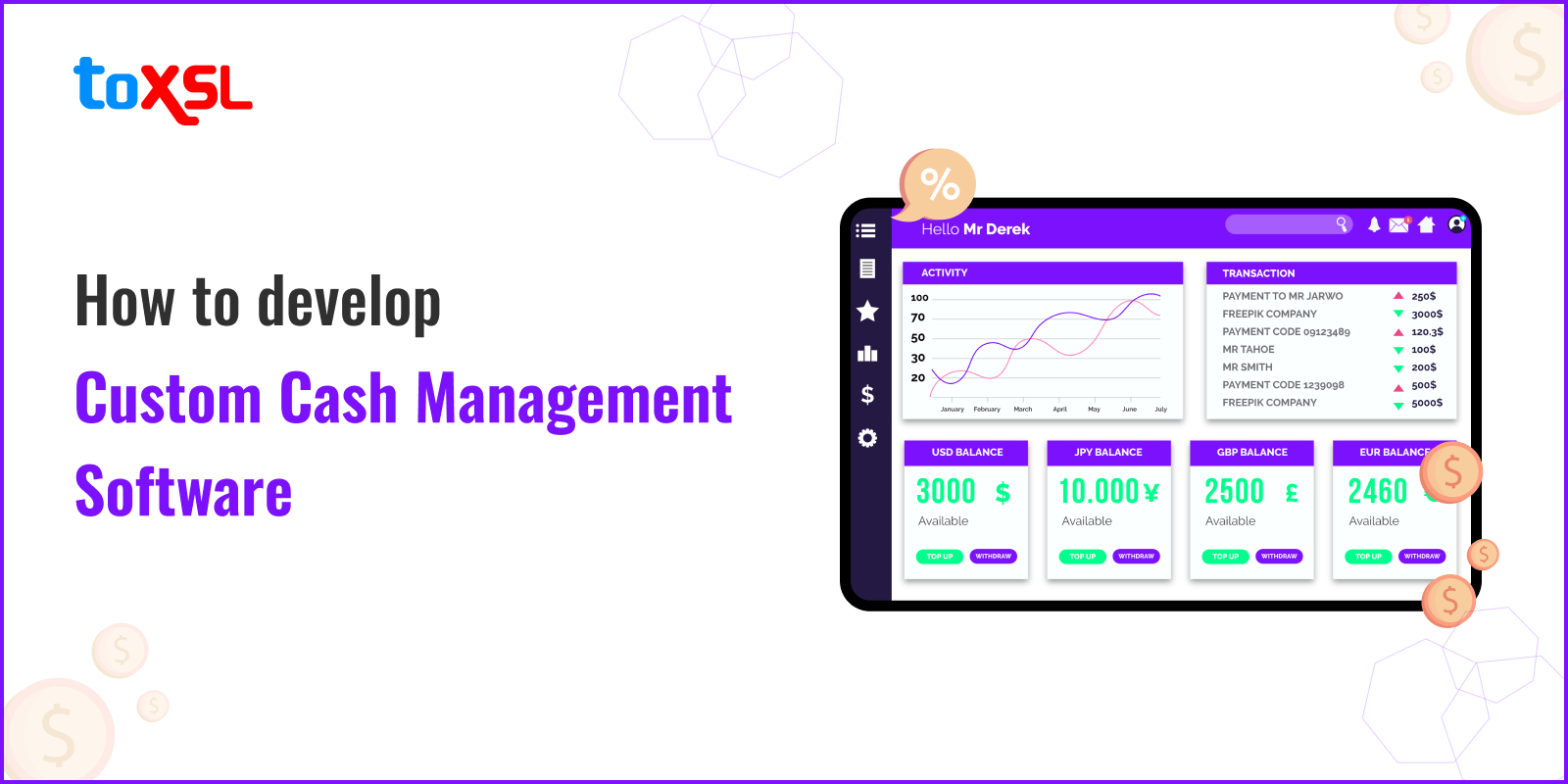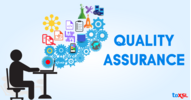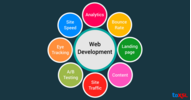- Apr 08, 2025
Share this post on:

Did you know 82% of small businesses fail due to poor cash flow management? According to grand view research, by 2027, the cash management system market size is estimated to reach USD 25.37 billion, at a CAGR of 12.6%.In the coming years, immense growth can be seen in the e-commerce and banking sectors. And, with the increasing demand for automated cloud-based solutions in banking, this can generate even more opportunities for the market.
Cash management systems are the tools that are designed to handle cash processing from end to end. These tools help businesses plan, track, and control the movement of cash in and out of the business. Cash management tools can easily give the money-related data of a company’s past, present, and future.
Cloud-based cash management systems can seamlessly integrate with existing enterprise resource planning (ERP) systems. This enables banks to effectively manage cash flow and payments across a network. This integration allows banks to enhance their money management systems and meet the needs of clients by offering real-time access to transactions.
Benefits of Cash Management Automation
Cash management software solutions can help businesses solve financial issues that businesses experience with traditional cash management. Cash automation helps businesses make the right decisions related to their cash inflow and outflow. It helps businesses to plan operational requirements in any situation. Let us now dive deeper into the blog and learn about the benefits of cash management automation software:
1. Cost Savings: Automating cash management processes leads to substantial cost reductions by minimizing manual labor and errors. This efficiency allows organizations to achieve higher productivity without needing to hire additional staff, ultimately freeing up resources for more strategic tasks. Additionally, automating foreign currency transactions can mitigate risks associated with currency fluctuations, further driving cost savings.
2. Enhanced Efficiency: Automation streamlines cash management tasks, enabling finance teams to process transactions faster and more accurately. By reducing the time spent on manual data entry and reconciliation, organizations can improve overall operational efficiency. This increased speed also contributes to better cash flow management, allowing businesses to respond swiftly to financial needs.
3. Increased Accuracy: Automated systems significantly improve the accuracy of cash management by minimizing human errors associated with manual processes. Advanced technologies like artificial intelligence and machine learning enhance data capture and transaction matching, ensuring that financial information is precise and up-to-date. This level of accuracy is crucial for maintaining reliable financial records and effective decision-making.
4. Fraud Detection: Automation enhances fraud detection capabilities by implementing systematic checks and balances that are often lacking in manual processes. Automated cash management systems can track transactions in real-time, making it easier to identify irregularities or suspicious activities, thereby safeguarding the organization’s financial assets.
5. Streamlined Payments: Automated cash management simplifies payment processes by enabling quick and accurate transaction handling. This streamlining not only reduces payment processing times but also improves cash flow visibility, allowing organizations to maintain better control over their financial operations. As a result, businesses can ensure timely payments, enhancing relationships with suppliers and customers alike.
6. Improved Customer Satisfaction: By ensuring that payments are applied swiftly and accurately, cash management automation contributes to enhanced customer satisfaction. Faster processing times reduce the likelihood of disputes or delays, fostering trust and loyalty among clients. A seamless payment experience is increasingly important in today’s competitive market.
Ways Cash Management Software Helps Businesses Manage Their Financial Data
Today, data is the king and the volume of data in the systems and banks increases as the company grows and opens new units. Hence, fetching the data from sources becomes difficult for financial analysis. So, how do companies manage data with a cash management solution? In this section, we will learn about a few ways that can help businesses analyze their financial data with the help of cash management software:
1. Automated Reconciliation: Cash management software automates the reconciliation process by matching transactions from bank statements with internal records. This automation reduces the time and effort required for manual reconciliations, minimizes errors, and accelerates the financial close process. For instance, advanced reconciliation tools can compile data, check for discrepancies, and update entries automatically, ensuring that financial records are accurate and up-to-date.
2. Real-time Dashboard: A real-time dashboard provides businesses with instant visibility into their cash positions and financial data. This feature allows finance teams to monitor cash flow, track transactions, and analyze financial performance at a glance. With customizable views, users can quickly access critical information needed for decision-making, enabling them to respond to changes in cash flow dynamics promptly.
3. Automated Data Segregation: Cash management software can automatically segregate financial data based on predefined criteria, such as transaction types or departments. This capability streamlines data organization and enhances reporting accuracy by ensuring that relevant information is grouped appropriately. Automated data segregation helps businesses maintain clarity in their financial records, making it easier to analyze trends and generate reports without manual sorting.
4. Secure Data at a Single Repository: By consolidating financial data into a single secure repository, cash management software enhances data security and integrity. This centralized approach allows businesses to store all financial information in one place, reducing the risk of data loss or unauthorized access. Additionally, having a single source of truth simplifies compliance with regulatory requirements and facilitates audits by providing a clear audit trail of all transactions.
Develop Custom Cash Management Software
Is your business struggling with the inaccurate cash flow reports? What do you need to understand to successfully develop cash management software? Once you can understand your business needs, you can successfully implement cash management technology into your everyday practices.
1. Planning and Strategy
• Define Clear Objectives: Establish specific goals for cash management automation, such as improving cash flow visibility, reducing processing times, or enhancing forecasting accuracy.
• Conduct a Needs Assessment: Evaluate current cash management processes to identify inefficiencies and areas for improvement. This assessment should involve stakeholders from finance, operations, and IT.
• Develop a Comprehensive Plan: Create a roadmap that outlines the steps for implementing cash management automation. This should include timelines, resource allocation, and key performance indicators (KPIs) for measuring success.
2. Customization and Integration
• Tailor Solutions to Business Needs: Customize cash management software to fit the unique requirements of the organization. This may include specific features for cash flow forecasting, multi-currency transactions, or compliance with local regulations.
• Ensure Seamless Integration: Integrate cash management systems with existing financial applications such as ERP systems, accounting software, and banking platforms. This integration facilitates real-time data exchange and improves overall efficiency.
• Utilize APIs for Flexibility: Leverage Application Programming Interfaces (APIs) to connect various software solutions. This allows for more flexible data management and enhances the ability to adapt to changing business needs.
3. Execution and Monitoring
• Implement Automation Tools: Utilize automation tools for tasks such as invoicing, payment processing, and reconciliation. Automating these processes reduces manual errors and speeds up cash flow cycles.
• Monitor Cash Positions in Real-Time: Establish systems for real-time monitoring of cash positions across various accounts. This enables quick identification of discrepancies and better liquidity management.
• Regular Reporting and Analysis: Generate regular reports that provide insights into cash flows, liquidity ratios, and other financial metrics. Use these reports to make informed decisions about investments and expenditures.
4. Management Involvement
• Engage Senior Leadership: Ensure that senior management is involved in the planning and implementation of cash management automation. Their support can drive organizational buy-in and resource allocation.
• Foster a Culture of Financial Awareness: Encourage all departments to understand the importance of cash management. Training sessions can help employees recognize how their roles impact overall financial health.
• Review Performance Regularly: Establish a routine for reviewing the effectiveness of the cash management system against set KPIs. Use feedback from these reviews to make necessary adjustments to processes or technologies.
Cost of Custom Cash Management Software?
The cost of creating custom cash management software can vary significantly based on several factors, including complexity, features, and the development team's expertise. Here’s a breakdown of the expected costs:
Cost Estimates
1. Basic Cash Management Software: Typically ranges from $10,000 to $50,000+. This level usually includes fundamental features and functionalities tailored to specific business needs.
2. Medium Complexity Solutions: Costs can range from $50,000 to $100,000+. These solutions often include more advanced features, such as integration with existing financial systems and enhanced reporting capabilities.
3. Advanced, feature-rich software: For highly complex systems with extensive functionalities and integrations, costs can exceed $100,000, potentially reaching up to $300,000 or more depending on the specific requirements and technology stack used.
Wrapping Up
In conclusion, we have now discussed the benefits and ways cash management software can help our businesses grow. We hope that now you have understood the benefits of opting for cash management software.
So, if you are looking to manage your cash flow, having cash management software can help you with that. But developing cash management software can be a challenging process and help you enhance your business. It is advised to hire a software app development company that can develop cash management software for your business.
If you are looking to manage finances with cash management software, ToXSL Technologies is here for you. With more than 12 years in business, we have helped businesses manage their cash flow using cash management software. Our team of seasoned developers develops the most efficient cash management app that can help you manage, track, and process your cash flow. Get in touch with us and enhance your cash flow process with us.
FAQS
1. What is custom cash management software?
Custom cash management software is a tailored solution designed to help businesses efficiently manage their cash flows, track financial transactions, and forecast cash needs. Unlike off-the-shelf software, it is built to meet the specific needs and workflows of an organization, ensuring better integration with existing systems and compliance with regulatory requirements.
2. What are the key steps involved in developing custom cash management software?
The development process typically includes several critical steps:
• Business Needs Analysis: Understanding the specific requirements and objectives of the organization.
• Designing Functionality: Creating the software architecture and tech stack based on the identified needs.
• Project Planning: Establishing deliverables, timelines, and budget.
• Development: Actual coding and building of the software.
• Quality Assurance: Rigorous testing to ensure functionality and security.
• Data Migration: Transferring data from existing systems or spreadsheets.
3. How much does it cost to develop custom cash management software?
The cost can vary widely based on several factors, including the complexity of features, customization requirements, integration needs, and the size of the development team. Generally, development costs can range from $10,000 to over $300,000. It's essential to conduct a thorough analysis of your specific needs to get an accurate estimate.
4. What are the benefits of custom cash management software compared to off-the-shelf solutions?
Custom cash management software offers several advantages:
• Tailored Features: It can be designed to include unique features that specifically address your business processes.
• Integration Capabilities: Custom solutions can seamlessly integrate with existing systems, ensuring smooth data flow and improved efficiency.
• Scalability: As your business grows, custom software can evolve alongside it, accommodating new functionalities and requirements without major overhauls.
• Compliance and Security: Custom solutions can be built with specific regulatory compliance in mind, enhancing data security tailored to your industry’s standards.











